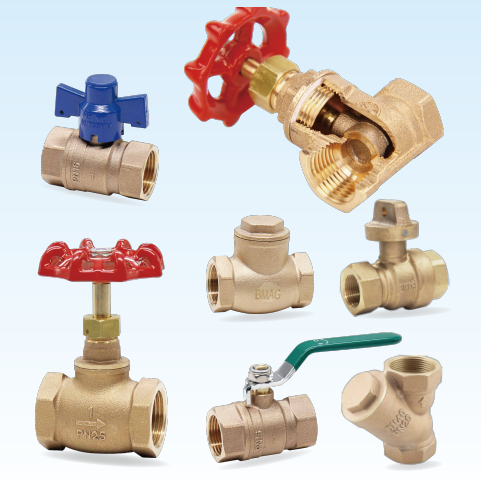What is a DZR Valves?
DZR valves, also known as an dezincification resistant valve, is made of specific brass. For example,CW602N, CW625N and CW724R. Dezincification causes corrosion, mainly when the brass is exposed to an environment with high concentrations of moisture and oxygen. Demand for DZR valves is continually growing due to their low cost, corrosion resistance, strength, electrical conductivity and machinability. With these qualities, they perform better than normal copper materials and other alloys.

What is Bronze Valve?
The main elements of bronze valves are tin and copper. Other alloying elements, such as aluminum or manganese, are added to zinc and copper to obtain specific properties. For example,C83600 , C84400 and C89833.
Compared to DZR material, bronze has been in use for the longest but it is slowly been abandoned due to its increasing cost.

Differences in Specifications of DZR and Bronze
Mainly difference is the chemical composition and physical properties:
| Chemical Composition. | DZR | Bronze |
| Copper. | 61-63% | 84-86% |
| Zinc. | / | 4-6% |
| Lead. | 1.7-2.8% | 4-6% |
| Tin. | 0.1% | 4-6% |
| Others. | Trace amounts of iron, arsenic, and impurities. | Trace amounts of Aluminium, Manganese, Nickel, or Zinc. |
Physical Properties of DZR vs. Bronze
| Properties | DZR | Bronze |
| Electric Conductivity. | 26% IACS. | 7.4 ×10 six siemens/m |
| Modulus Of Elasticity. | 106 KN/ mm2 | 72.4 KN/ mm2 |
| Melting Point. | 910°C. | 1040 °C |
| Density. | 8.43g/ cm3 | 8.8 g/ cm3 |
| Specific heat. | 0.377 KJ/kg K | 0.435 KJ/kg K |
| Thermal Conductivity at 20°C. | 117 W/m° K | 85 W/m° K |
| Thermal Expansion Coefficient. 20-200°C | 20.7 × 10-6 per °C | 17 × 10-6 per °C |
| Electric Resistivity. | 0.066 ohm mm2 /m | 13.5ohmsm |
DZR Valve & Bronze Valve Working Temperature
DZR valves have a high working temperature that ranges from -20°C to 120°C when compared to traditional brass valves. Bronze valves on the other hand have much higher working temperatures. The working temperature for bronze valves depends on the specific alloy composition and the application. For example, an aluminum bronze valve can handle temperatures ranging from around -100°C to 400°C.
DZR Valve & Bronze Valve Working Pressure
Bronze valve’s working pressure also depends on its alloy composition, valve design, and the application. For low-pressure applications, the working pressure can be around 150 psi while high-pressure applications can reach 1500 psi. In other words, DZR valves also range in working pressure depending on various factors such as application, valve design, material used, and size. This means that you can achieve a working pressure of as low as 150 psi and as high as 1500 psi or more.
Why to use DZR valve
- Unique Structure: DZR valves contain a thickened body structure. The raw materials in its composition has a very high tensile strength. It not only gives it a thicker system but also enables high protection. This tight alignment of DZR valves makes them highly resistant to increased pressure.
- Corrosion Resistant: The chemical composition of DZR reveals the presence of arsenic. It adds to the corrosion-resistant properties of DZR valves. Besides, DZR valves are best known for their remarkable performance in seawater. They can withstand the high salt contents of seawater without corrosion or damage.
- Flow Control: DZR valves are perfect controlling water flow or other liquids. They stop zinc from getting corrosion. Therefore, no zinc is released in flowing fluids. DZR valves have quality control products in a wide range. They are best for water control purposes. Especially in the case of potable water, they don’t pollute water with the loss of metals.
Why to use Bronze valve
- Ductile Property: The plumbing fittings need to deal with many changes. Usually, we need to make slight adjustments while installing valves. Bronze valves are more flexible. We can quickly draw them by heating them at a specific temperature.
- Cost-Effective: Bronze valves are probably the only ones in the market that cost less than other metallic alloys. They provide us with the best version of services by keeping it budget-friendly. It is one of the solid reasons why you should use bronze valves.
- Resistance Against Saltwater: A few metals, like brass, are very efficient but cannot perform well in salt water. However, bronze is perfect for dealing with saltwater in marine operations. It is equally effective for soft and hard water. We can say that bronze is good at corrosion resistance and saltwater resistance.
Conclusion
DZR and bronze are both efficient metal alloys. They differ in a few properties, but has its own functions. If you choose one of these products, we suggest you analyze your requirements thoroughly. Then, select the right one depending on the Valve’s media flow, temperature, and physical endurance. It will enable you to get the best product with stunning features.






